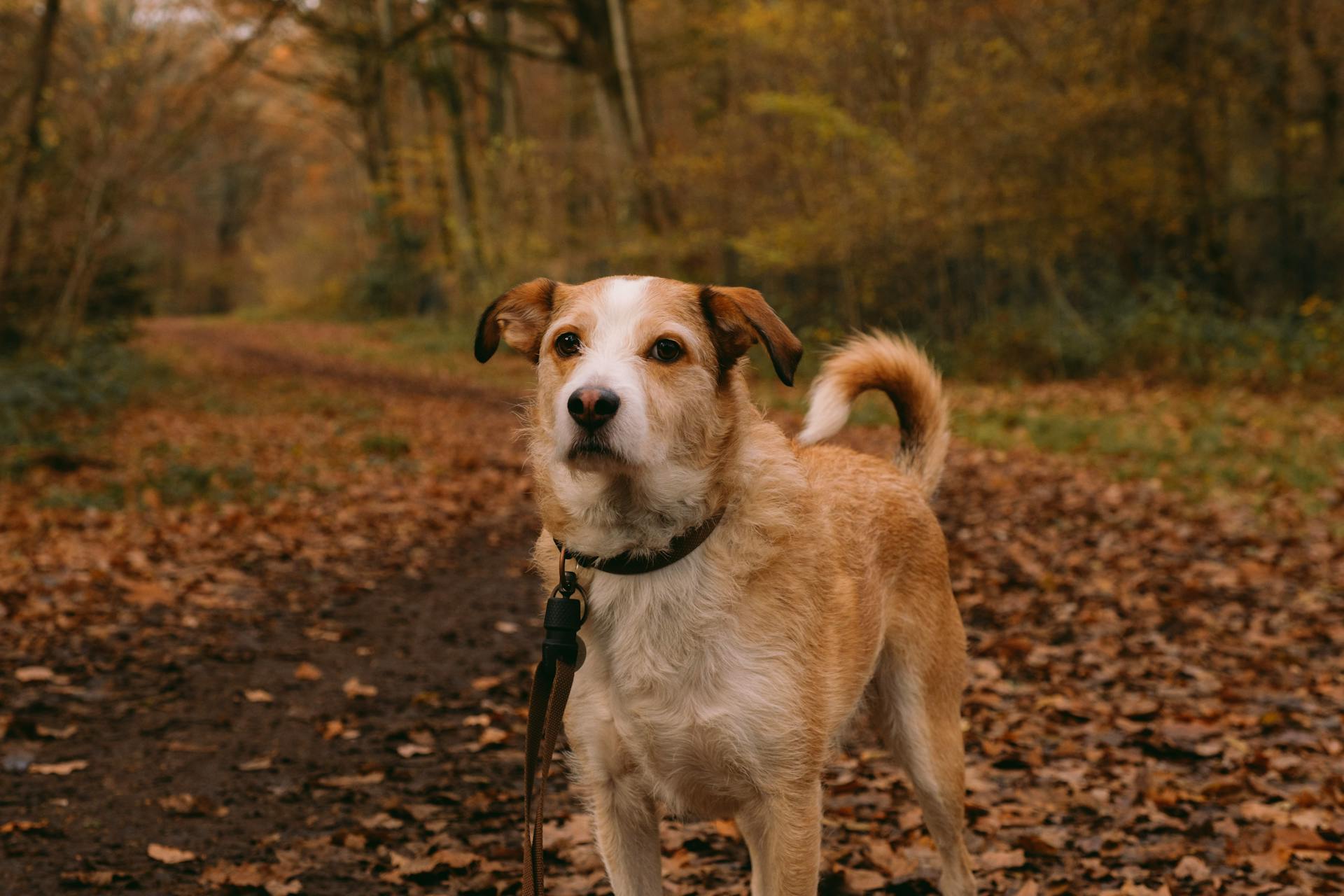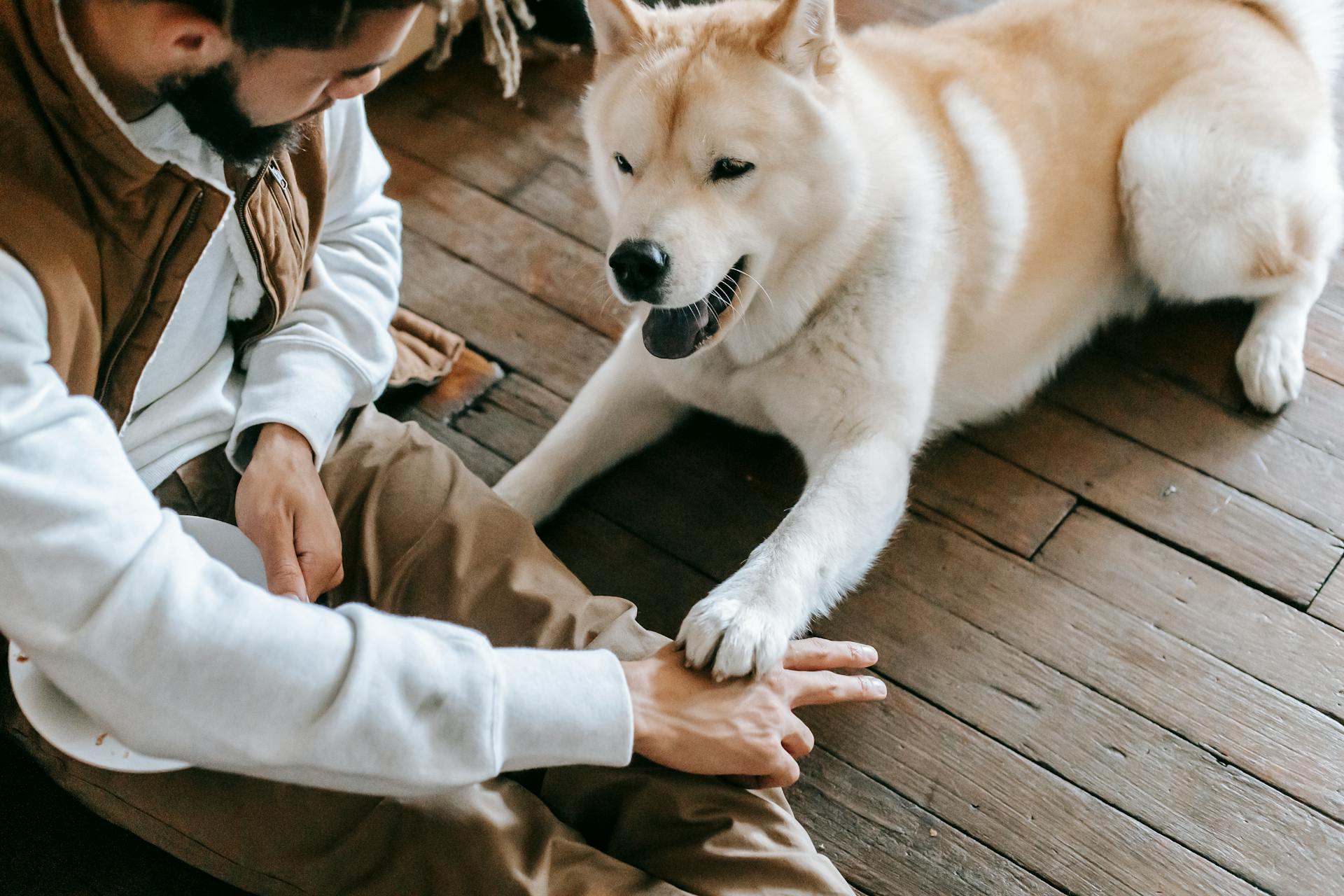
Shih Tzus are known to make a variety of noises, and understanding what they mean can help you better care for your furry friend.
One of the most common Shih Tzu noises is the yip or high-pitched bark, which can be a sign of excitement or alertness. They may yip when they see another dog or person, or even when they sense something unusual in their environment.
Shih Tzus are also prone to whining, which can be a sign of anxiety or boredom. They may whine when they're left alone or when they want attention from their owners.
A growl is another common Shih Tzu noise, and it's often a sign of fear or defensiveness. They may growl when they feel threatened or when they're protecting their food or toys.
Understanding Shih Tzu Noises
Shih Tzus are known to be vocal dogs, but they're not necessarily big barkers. Their high-pitched barks can be irritating after a while, especially in urban areas where their constant barking can become a nuisance to neighbors.
Smaller dogs like Shih Tzus have higher-pitched barks, which can be a disadvantage. They're bred to be companion dogs and are very attached to their owners, often barking out of loneliness or anxiety when they can't be by your side.
Shih Tzus are naturally suspicious of strangers and see their home as their domain, barking at anything that enters it. They're territorial and will bark at people, animals, or even a piece of mail.
Their barking can be triggered by various things, such as sirens or being put to bed. If you know what triggers their barking, you can take steps to eliminate it, like playing a loud song on the radio to drown out the sound of sirens.
Shih Tzus may also howl, which can be a way for them to communicate with you. They may howl when they're excited, lonely, or trying to get attention.
Deciphering Shih Tzu Sounds
Shih Tzus are known to be vocal dogs, and their barks can be quite loud. They tend to bark out of loneliness or anxiety when they can't be by their owner's side. Shih Tzus are also very territorial and will bark at anything that enters their home, whether it's a person, animal, or even a piece of mail.
Their barks can be high-pitched or deep, and their body language can give clues about what they mean. A crouched, angry bark with hackles up can indicate fear or aggression. On the other hand, a bark accompanied by a wagging tail often spells joy.
If you're having trouble deciphering your Shih Tzu's barks, here are some common reasons why they might be barking:
• Loneliness or anxiety
• Territorialism
• Alerting you to something outside
• Wanting attention
• Boredom or needing exercise
Keep in mind that every dog is different, and it may take time to understand what your Shih Tzu is trying to communicate.
Deciphering Barking
Deciphering Shih Tzu sounds can be a challenge, but once you get to know your dog's unique vocal cues, it's easier to understand what they mean.
High-pitched barks may be welcoming, while deep barks may be your Shih Tzu issuing an alert.
A bark accompanied by a wagging tail often spells joy, but a crouched, angry bark with hackles up can indicate your dog is feeling fear or aggression.
Check this out: Information on Shih Tzu Dogs
Smaller dogs like Shih Tzus have higher-pitched barks, which can be irritating after a while.
Shih Tzus are very attached to their owners and want to be with them at all times, which can lead to barking out of loneliness or anxiety when they can't be by your side.
Their territorial nature also means they bark at anything that enters their home, whether it's a person, animal, or even a piece of mail.
Your Shih Tzu may bark when they hear a noise or see something outside the window, or even to get your attention to indicate that they want to eat, play, or come in from outside.
Dogs bark to communicate, and with time, you can learn to differentiate between their various barks.
Deciphering Whining
Dogs whine to express their needs, whether it's to go outside, get fed, or play fetch. Their body language can give you clues about what they're trying to communicate.
If your Shih Tzu crouches with their head or ears down, it could mean they're in pain. Some dogs whine in anticipation, like when you're preparing their food or a treat.
Look to their body language to help figure out what they want. Ask yourself, "What is my dog wishing for right now?" Their whine is often their way of letting you know they're unhappy or need something.
Dogs may whine when they're scared, such as during a thunderstorm, or if they have separation anxiety and are left alone. Their high-pitched cry is a clear signal that they need attention or comfort.
Some dogs whine when they're in pain, like when they step on a burr and cry out when they put their foot down. It's a clear "Ow, that hurts!" message.
For another approach, see: How Much Walking Does a Shih Tzu Need
Deciphering Growling
Growling can be a concerning sound, especially if you're not sure what it means. In a study, researchers found that humans are actually quite good at discerning when a growl is serious versus when it's playful.
Your Shih Tzu's body language can give you clues about the threat level. Pay attention to their ears, tail, stance, and tone during a growl. A serious growl often involves a stiffened posture, flattened ears, and a low, rumbling growl.
It's essential to recognize the difference between a playful growl and a serious one. A playful growl is typically softer and lower-pitched, often accompanied by a wagging tail.
Here are some signs that your Shih Tzu's growl is serious:
- Stiffened posture
- Flattened ears
- Low, rumbling growl
- Direct stare or avoidance
If you notice any of these signs, it's best to give your Shih Tzu space and let them calm down. Remember, growling is a warning sign, and it's essential to address the underlying issue to prevent escalation.
Deciphering Howling
Dogs howl for various reasons, and it's essential to understand what's behind the behavior.
Some dogs may howl as a greeting, announcing their presence to the world.
Others might howl because they've found something interesting, like a new smell or a hidden treat.
Your Shih Tzu might even howl to release pent-up energy, similar to how a good scream can be cathartic for humans.
If your dog is howling, take a closer look at what they're doing. Are they trying to initiate play or get attention?
Your Shih Tzu might be howling because they're lonely or bored, and need more interaction or stimulation.
Deciphering Singing
Deciphering Singing is a fascinating topic, especially when it comes to Shih Tzus. Dogs may sing as an instinctual reaction left over from their wild ancestors, the wolves.
Many Shih Tzus learn to sing by repetition and association. They find that certain noises get them the results they want, so they continue to use them to communicate with their owners.
Some Shih Tzus enjoy singing so much that they'll even try to sing along to music or sounds on television. If the pitch is right, they'll belt out a chorus.
If you want to encourage your Shih Tzu to sing, you can teach them to croon on command and reward them with treats. You can also play their favorite trigger music to get them singing.
Related reading: Why Is My Shih Tzu so Itchy
Causes of Shih Tzu Noises
Shih Tzus are prone to making various noises, and understanding the causes can help you address the issue. Reverse sneezing is a common occurrence in Shih Tzus, caused by irritation in the throat or back of the nose.
Some common causes of reverse sneezing include pollen, dust, or allergens, perfumes, post-nasal drip or nasal inflammation, and household cleaners or chemicals. These can irritate the throat and trigger a reverse sneezing episode.
Here are some common causes of reverse sneezing in Shih Tzus:
- Pollen, dust, or allergens
- Perfumes
- Post-nasal drip or nasal inflammation
- Household cleaners or chemicals
Shih Tzus are also known to bark frequently, often due to their territorial nature. They may bark at strangers, other animals, or even mail. Their high-pitched barks can become a nuisance to neighbors.
Causes of Reverse Sneezing
Reverse sneezing in Shih Tzus can be a concerning issue, but it's often caused by something as simple as getting overly excited. This triggers irritation in the throat or soft palate, leading to the characteristic loud snorting noise.
Rapid eating and drinking can also cause reverse sneezing, as the sudden movement of food or liquid can irritate the throat. It's a good idea to feed your Shih Tzu slowly and in a calm environment to minimize the risk of this happening.
Pollen, dust, and allergens can also trigger reverse sneezing, so keeping your home clean and free of potential allergens is a good idea. Perfumes and household cleaners can also be culprits, so it's best to avoid using them around your Shih Tzu.
Post-nasal drip or nasal inflammation can cause reverse sneezing, and this can be a sign of an underlying condition that needs attention. If you notice your Shih Tzu's reverse sneezing is becoming more frequent or severe, it's a good idea to consult with your vet.
Here are some common causes of reverse sneezing in Shih Tzus:
- Getting overly excited
- Rapid eating and drinking
- Pollen, dust, or allergens
- Perfumes
- Post-nasal drip or nasal inflammation
- Household cleaners or chemicals
- Viruses or mites
- Exercise intolerance
- Pulling on a leash
- Foreign substances in the throat
Other Causes
Other causes of Shih Tzu noises can be quite varied. Some of these causes can be harmless, while others may require veterinary attention.
Anything that irritates the throat or soft palate can trigger reverse sneezing in Shih Tzus, such as pollen, dust, or allergens.
Rapid eating and drinking can also lead to reverse sneezing in Shih Tzus. I've seen this happen when they gobble down their food too quickly.
Perfumes, household cleaners, or chemicals can cause irritation and lead to reverse sneezing in Shih Tzus. Keep these substances out of reach to prevent this.
Some underlying health issues, such as heart conditions, can also cause snorting or other unusual noises in Shih Tzus. If you're concerned, it's always best to consult your veterinarian.
Here are some common causes of reverse sneezing in Shih Tzus:
- Pollen, dust, or allergens
- Rapid eating and drinking
- Perfumes
- Household cleaners or chemicals
- Viruses or mites
- Exercise intolerance
- Pulling on a leash
- Foreign substances in the throat
Ensure your Shih Tzu is up to date with preventative health care, such as vaccinations and parasite treatments, to reduce the risk of underlying health issues.
Check this out: Shih Tzu Health
Sources
- https://www.akc.org/expert-advice/advice/canine-communication-deciphering-different-dog-sounds/
- https://dogtime.com/dog-health/52371-dog-honking-reverse-sneezing
- https://www.dogster.com/dog-health-care/why-does-a-shih-tzu-snort
- https://www.miracleshihtzu.com/shih-tzu-howling.html
- https://www.dogster.com/dog-breeds/do-shih-tzus-bark-a-lot
Featured Images: pexels.com


